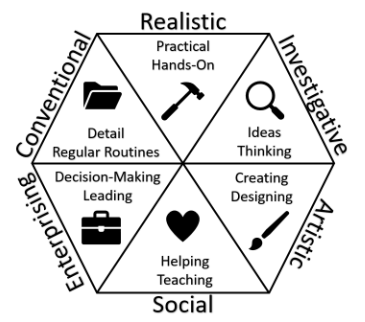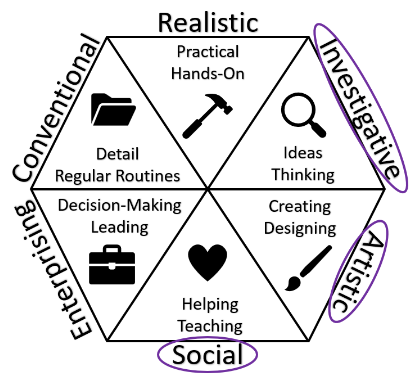Lauren S. Grider, DVM, CCFP
In the last article we met Sydney*, a longtime veterinary technician who was experiencing feelings of guilt surrounding her need for a job change. After examining the ways in which her work in the veterinary field both contributes to her core identity and impacts her other roles and responsibilities, she was able to feel more secure about her decision to change her relationship with work and start considering other career opportunities. But even though Sydney now feels confident that a job transition is the best plan for her family, there’s another problem: She doesn’t know what to do next. Sydney has spent most of her adult life working as a veterinary technician. She’s not sure which of her skills are transferable to other types of work, and she doesn’t know what sorts of jobs she might be interested in. Where should she start?
Finding the Right Fit: The Importance of Understanding Your Career Interests
In the 1950s, noted vocational psychologist John L. Holland published a series of articles about the importance of achieving a good fit, or congruence, between an individual’s personality and the characteristics of their job. Holland’s theory sorts both personality types and career characteristics into six categories: Realistic, Investigative, Artistic, Social, Enterprising, and Conventional (RIASEC). These categories are typically represented in a hexagonal pattern (Figure 1) such that similar characteristics neighbor one another and opposite types are located across from one another. For example, note in the figure below that Social and Artistic characteristics are strongly related, while Social and Realistic characteristics have little overlap.
Figure 1

The image above outlines the RIASEC categories and their common characteristics:1
- Realistic personality types enjoy practical, hands-on activities.
- Investigative personality types are curious and enjoy exploring ideas in detail.
- Artistic personality types are creative and have a flair for design.
- Social personality types enjoy helping and teaching others.
- Enterprising personality types enjoy leading and making business decisions.
- Conventional types enjoy detail and organization, and they prefer regular routines.
These characteristics combine to form a three-letter code which can be used to identify areas of career interest and to predict vocational congruence. Achieving a good fit between individual interests and career characteristics is associated with higher job satisfaction, better performance outcomes, and improved career path satisfaction.2
Holland’s theory is now widely accepted in the field of career counseling and has been used to develop the U.S. Department of Labor’s Occupational Information Network (O*NET) Interest Profiler. This 60-question RIASEC quiz is quick, easy, and free for everyone! Once the RIASEC code is generated, the O*NET site can also be used to research jobs that tend to be a good fit for people with those characteristics.
Putting the Interest Profiler to Work
After answering the questions in the O*NET Interest Profiler, Sydney finds that her RIASEC code is Social, Artistic, and Investigative (SAI). According to these results (Figure 2), Sydney would likely enjoy jobs in which she can use information gathering skills and creative problem solving in a helping or teaching role.
Figure 2

O*NET also provides Sydney with a list of careers that people with the SAI personality type tend to enjoy. On that list she finds some exciting possibilities including several types of teaching and counseling. From here, Sydney can research congruent career choices, including the amount of education needed for each type of job and how quickly each field is growing. She can also use O*NET to generate lists of recommended types of jobs based on her current duties, work-related activities, soft skills, technological abilities, and work values.
After considering these results, Sydney recognizes that a job in veterinary education would likely be a good fit for her. Such a job would involve helping and teaching students, creating engaging lesson plans, and gathering information to present in lectures. She is very excited because this is an avenue that she had not previously considered, and she sets out to learn more about teaching opportunities in her area.
Sydney has also considered applying for a position as a pharmaceutical representative. However, she notices that Enterprising and Conventional types tend to enjoy jobs in pharmaceutical sales and that these categories are situated on the opposite side of the RIASEC hexagon from her Investigative and Artistic traits. This may mean that Sydney will have trouble finding satisfaction with a job as a pharmaceutical representative. However, because the Social and Enterprising categories share some similarities, she may instead find that there is enough overlap to make a pharmaceutical sales job an attractive option. With this in mind, Sydney decides to get more information about the specific duties involved in this type of work so that she can better decide whether it would be something she would enjoy.
Now that Sydney knows more about her own work interests, skills, and values, she is in a much better position to critically evaluate job opportunities and curate a list of positions for which she would like to apply. In the next article, we will continue to follow Sydney as she dusts off her resume and enters the job market for the first time in twenty years!
*Name changed to protect anonymity.
This is part two of a multi-part series on career identity and job satisfaction. View the previous part here. The next part may be viewed here.
References
1. Holland, J. L. (1985). Making vocational choices: A theory of vocational personality and work environments. Prentice Hall.
2. Hoff, K. A., Song, Q. C., Wee, C. J. M., Phan, W. M. J., & Rounds, J. (2020). Interest fit and job satisfaction: A systematic review and meta-analysis. Journal of Vocational Behavior, 123(1), 103503. https://doi.org/10.1016/j.jvb.2020.103503

